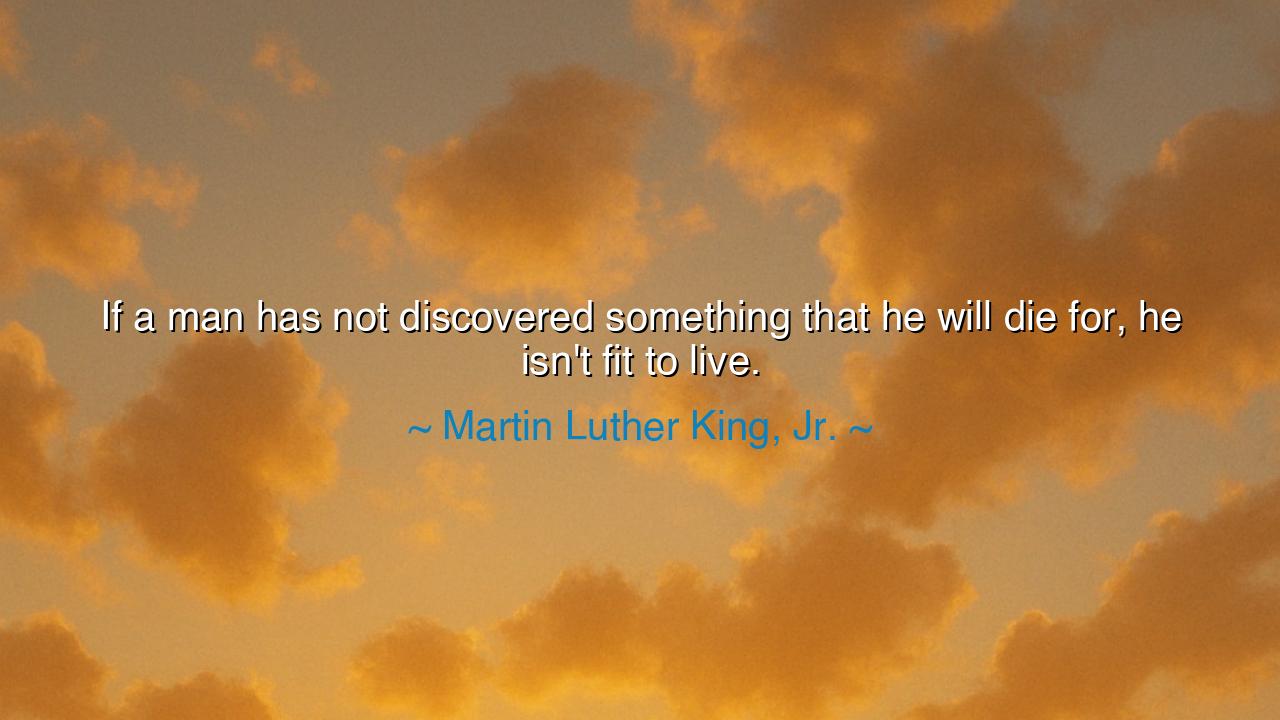
If a man has not discovered something that he will die for, he






“If a man has not discovered something that he will die for, he isn’t fit to live.” Thus thundered Martin Luther King, Jr., the prophet of peace and courage, whose words burned with the fire of conviction. These are not the soft words of comfort—they are the call to purpose, the challenge to the soul to rise above the shallow existence of survival and to live instead for something eternal. In this one sentence, King distilled the essence of what it means to be truly human: that life without meaning is merely existence, and that meaning is born only when one’s life becomes an offering to something greater than oneself.
King spoke these words during the height of the Civil Rights Movement, a time when injustice stalked the streets of America and the air itself seemed heavy with fear. His message was not theoretical; it was lived truth. Every march he led, every sermon he preached, every act of nonviolent resistance carried with it the understanding that death could come at any moment. Yet he did not shrink from the danger, for he had already discovered what he was willing to die for—justice, equality, and love. His life was anchored not in safety, but in sacrifice. And so he could face death with serenity, knowing that his life was not wasted in comfort but spent in service to the divine cause of human dignity.
The ancients, too, knew this truth well. The Greeks called it arete—the excellence of the soul found in courage and virtue. Socrates drank the hemlock willingly rather than betray his conscience. He told his accusers that “the unexamined life is not worth living,” which is the echo of the same wisdom King proclaimed millennia later. To live without purpose, to exist only to avoid pain or prolong comfort, is to live as a shadow and not as a man. For life itself demands devotion—devotion to truth, to justice, to love, to something sacred that transcends the fleeting breath of mortality.
Consider also the story of Mahatma Gandhi, whom King called his spiritual father. Gandhi walked barefoot across India, fasting, protesting, and praying, all in pursuit of freedom for his people. He faced bullets and imprisonment, yet his spirit remained unbroken. He said, “There are many causes I am prepared to die for, but none I am prepared to kill for.” In this paradox lies the same noble truth: that the worth of a life is measured not by what one takes, but by what one is willing to give up. Like Gandhi, King understood that nonviolence is not weakness—it is the strength that flows from one who has conquered the fear of death.
When King said that a man not willing to die for something “isn’t fit to live,” he was not glorifying death—he was sanctifying commitment. His words are not a hymn to martyrdom, but to purpose. To live well, he teaches, is to know what matters so deeply that one’s comfort, one’s reputation, even one’s very life, are as nothing compared to it. For those who live only to protect themselves, life becomes small and fearful. But those who live for truth burn brightly, even if their light is brief. The body may fall, but their spirit kindles generations yet unborn.
The meaning of King’s words, therefore, is both moral and spiritual. They call us to examine our own hearts: What do we stand for? What principle, what vision, what love is so sacred to us that we would endure anything rather than betray it? Such discovery transforms life from a passing moment into an eternal legacy. To find what you would die for is to find what you were born for. Without such discovery, we drift—alive in body, but dead in purpose.
The lesson, my listener, is clear: seek the cause that gives your life meaning. It need not be grand or public; it may dwell in quiet places—the defense of truth, the protection of innocence, the pursuit of beauty, the act of love. But whatever it is, serve it with all your heart. Let it shape your days and steady your courage. Fear not death, for death comes to all; fear instead the life that passes without purpose. For when you live for something worth dying for, you conquer death before it reaches you.
So remember the voice of Martin Luther King, Jr.—“If a man has not discovered something that he will die for, he isn’t fit to live.” Let these words be the fire in your blood and the compass of your soul. Live as one who belongs to a great purpose, and your life will shine like a torch in the darkness. Even when your body returns to dust, your spirit will remain in the world as a force of courage, of goodness, of light—and that is the true victory over death itself.






AAdministratorAdministrator
Welcome, honored guests. Please leave a comment, we will respond soon